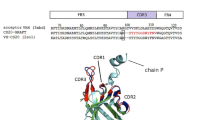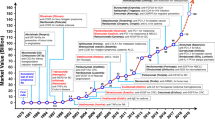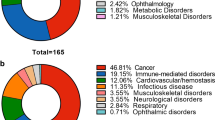Abstract
The production of antitumor human monoclonal antibodies (MoAbs) by human-human or mouse-human hybridoma technology was studied. UC 729-6, a thioguanine-resistant, HAT-sensitive human lymhoblastoid B cell line or NS-1, a mouse myeloma cell line, were fused with lymphocytes isolated from regional lymph nodes of cancer patients, resulting in 130 Ig-secreting human-human hybrids and 21 human Ig-secreting mouse-human hybrids. The supernatants of 88 hybrids were screened against a panel of cancer cell lines using a microspot smear method developed in this laboratory.
The results showed that the supernatants of 37 human-human hybrids and two mouse-human hybrids reacted against a number of cancer cell lines. However, after subcloning for three times, only one human-human hybridoma (MUBL-6) and one mouse-human hybridoma (HMG-1) secreted human MoAbs in continuous culture for 9–12 months.
In an immunohistological study by PAP, MUBL-6, a human-human hybridoma derived from the lymph nodes of breast cancer patients, stained positively with malignant cells of breast cancer simplex but not with stroma cells of the same tissue section. HMG-1, a mouse-human hybridoma derived from lymphocytes of a patient with gastric adenocarcinoma secreted IgM and reacted with malignant adenoepithelial cells of gastric cancer but not with normal gastric adenoepithelial or stroma cells. There was also some complement-dependent cytotoxicity against gastric cancer cells MGC-823.
Ascites was obtained by injecting antibody-producing human-human or mouse-human hybrids into BALB/c nude mice pretreated with antilymphocyte serum and pristane. The human MoAb obtained from ascitic fluid was 100–1000 times greater than that of culture supernants.
Similar content being viewed by others
References
Mitchell MS, et al. Hybridomas in cancer diagnosis and treatment. Prog Cancer Res Ther 1982; 21:258.
Hammerling GJ, et al. (eds). Monoclonal Antibodies and T Cell Hybridomas Perspective and Technical Advances, Elsevier: Amsterdam. 1981; 157–242.
Ritts RE, et al. Initial clinical evaluation of an immunoradiometric assay for CA 19-9 using the NCI serum bank. Int J Cancer 1984; 33:339.
Old LT. Cancer immunology: The search for specificity. Cancer Res 1981; 41:361.
Steinitz M, et al. Virus-induced cell lines producing specific antibody. Nature 1977; 269:420.
Schlom J, et al. Generation of human monoclonal antibodies reactive with human mammary carcinoma cells. Proc Natl Acad Sci USA 1980; 77:6841.
Olsson L, Kaplan HS. Human-human hybridomas producing monoclonal antibodies of predefined antigenic specificity. Proc Natl Acad Sci USA 1980; 77:5429.
Sikora K, et al. Human hybridoma from patients with malignant disease. Br J Cancer 1983; 47: 135.
Glassy MC, et al. UC 729-6 a human lymphoblastoid B-cell line useful for generation of antibody-secreting human-human hybridomas. Proc Natl Acad Sci USA 1983; 80:6327.
Olsson L, et al. Antibody producing human- human hybridomas, II. Derivation and characterization of an antibody specific for human leukemia cells. J Exp Med 1984; 159:537.
Strelkauskas AJ, Taylor CL. Human monoclonal antibody. Construction of stable clones reactive with human breast cancer. Cancer Immunol Immunother 1986; 23:31.
1986.6(1):26.
Abrams PG, et al. Determination of the optimal human cell lines for development of human hybridomas. J Immunol 1983; 131:1201.
Glassy MC, et al. Design and production of human monoclonal antibodies to human cancers. In: Human Hybridomas and Monoclonal Antibodies, edited by EG Engleman et al. 1985; 211–243.
Weiss MG, Green H. Human-mouse hybrid cell lines containing partial complements of human chromosomes and functioning human genes. Proc Natl Acad Sci USA 1967; 58:1104.
Imam A, et al. Generation and immunohistological characterization of human monoclonal antibodies to mammary carcinoma cells. Cancer Res 1985; 45:263.
Burnett KG, et al. Human monoclonal antibodies to breast tumor cells. In: Monoclonal Antibodies Diagnostic and Therapeutic Use in Tumor and Transplantation, edited by SN Chattenjal, 1985; 47–61.
Roder JC, et al. The Epstein-Barr virushybridoma technique. In: Human Hybridomas and Monoclonal Antibodies, edited by EG Engleman. 1985; 63.
1986;1:6.
Author information
Authors and Affiliations
Rights and permissions
About this article
Cite this article
Liu, H., Xu, ZL., Wang, Y. et al. Production of antitumor human monoclonal antibodies by human-human or mouse-human hybridoma. Chin J Cancer Res 1, 20–28 (1988). https://doi.org/10.1007/BF02997636
Issue Date:
DOI: https://doi.org/10.1007/BF02997636




